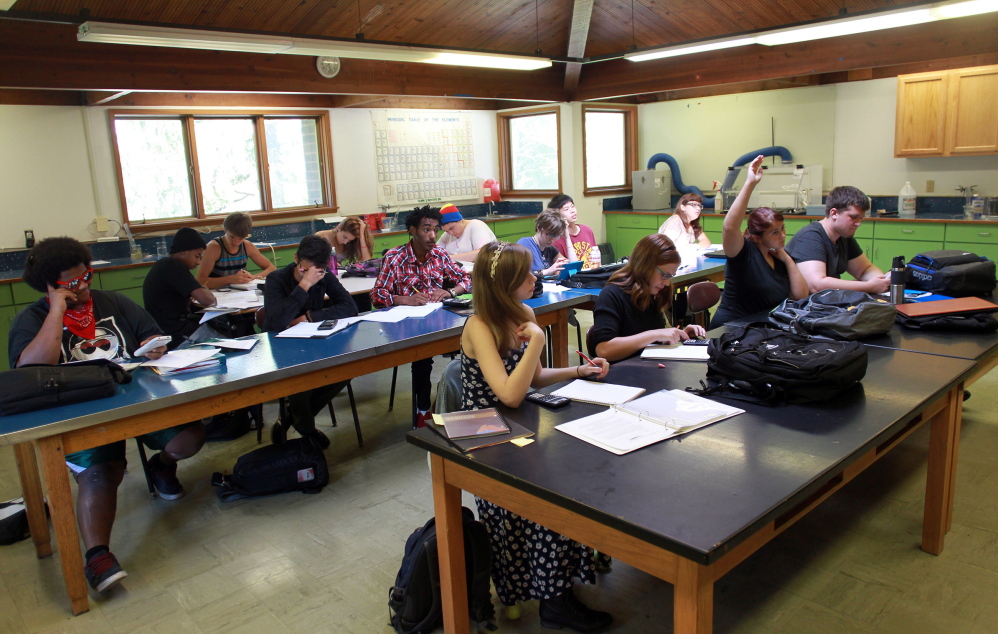IOWA CITY, Iowa — Images of students milking cows and watching cows give birth are among Don Laughlin’s memories of Scattergood Friends School.
Laughlin, 91, said that in the 1940s and 1950s when he worked at Scattergood, he taught at the school, managed its farm and oversaw students’ work there. He said he remembers helping them learn how to do chores, such as feeding pigs on the farm and driving tractors, and that students were eager to lend him a hand.
“I always got easy volunteers for the farm,” he said.
The 125th anniversary of Scattergood is approaching. The school, which sits on 35 acres of farmland, is likely the only Religious Society of Friends, or Quaker, school in Iowa. It offers students in grades nine through 12 a boarding- or day-school education.
Friends schools are based in Quaker traditions. The Quaker religion is a Christian denomination focused on ideals such as simplicity, social equality, pacifism and integrity that people practice in many forms, according to the Quaker Information Center website.
Iowa Yearly Meeting Conservative, a Quaker association, owns the not-for-profit school, and the school is governed by a school committee made up primarily of Quakers.
CORE VALUES IN PLACE SINCE 1890
Communications director Jody Caldwell said although some things at Scattergood have changed since 1890, many of the school’s core values remain unaltered. She said students and staff still focus on traditional Quaker ideals and hold decision-making meetings rooted in Quaker heritage.
Caldwell said the school uses hands-on learning methods that sometimes incorporate the farm.
“We are not a place that we want to sit in desks all the time and look at dusty textbooks,” she said.
During the late 1800s, Quakers near West Branch began planning to open a Quaker boarding school, according to a 1990 history of Scattergood Friends School written by Robert Berquist, David Rhodes and Carolyn Smith Treadway.
The history includes a student’s first-person account of Scattergood penned shortly after the school opened. The student described waking up to “the twenty-minute bell,” attending breakfast and lessons and watching students rejoice or fret over letters received during mail delivery at recess.
Head of school Christine Ashley said Scattergood at that time focused on educating Quaker youth in West Branch, Whittier and other areas.
“This was a place where you were taught how to live the Quaker values and principles,” she said.
She said Quaker schools then aimed to keep young people “safely guarded and insulated from the evils of the world.”
However, Ashley said that this aim has changed. She said the school now focuses on helping students “be prepared to meet the challenges of the world.”
The school’s population also has changed since 1890 – only 20 percent of students and staff at the school are Quakers or have Quaker affiliations.
Scattergood Friends School closed during the Great Depression for “financial reasons” and reopened in 1939 as a refugee hostel for people fleeing from areas affected by Nazism, according to the written history.
A Scattergood pamphlet from that period says that the hostel was a place where European refugees “could go for a few weeks or months to re-improve their English, learn to drive a car, and if need be, start retraining themselves for some new line of work before seeking a permanent place in American society.”
Ashley said during the 1930s, a group of “twenty-somethings” connected with the American Friends Service Committee in Washington, D.C., and raised money to open the hostel, which housed 168 people between 1939 and 1943.
“This was Iowa’s direct contribution, humanitarian contribution, to the war that had already spilled over in Europe,” she said.
HOSTEL FOR JEWISH REFUGEES
Laughlin, who began working at Scattergood three years after the hostel closed, said the school served a key purpose as a refugee hostel. He said he heard the hostel was home to Jewish people fleeing Germany, and that refugees there faced challenges such as learning a new language and doing work unrelated to their areas of expertise while they adjusted.
“They just couldn’t practice their professions at all,” he said.
During the late 1940s and early 1950s, Ashley said the Quaker principles of integrity and peace “played out strongly” when Laughlin became a conscientious objector during a 1949 peacetime conscription, while he worked at Scattergood.
Laughlin said he didn’t agree with the draft and that he was sentenced to 18 months in prison for resisting, although he was released 12 months early.
“I think it was the right thing to do,” he said.
Laughlin said he recalls students and staff at Scattergood being sympathetic to his situation and said he returned to the school after his time in prison.
Ashley said during the 1960s at Scattergood, “hem lines rose” and rules, including prohibitions on students listening to the radio more than once a week and standing within six inches of a “friend of the opposite sex,” were lifted.
Send questions/comments to the editors.



Success. Please wait for the page to reload. If the page does not reload within 5 seconds, please refresh the page.
Enter your email and password to access comments.
Hi, to comment on stories you must . This profile is in addition to your subscription and website login.
Already have a commenting profile? .
Invalid username/password.
Please check your email to confirm and complete your registration.
Only subscribers are eligible to post comments. Please subscribe or login first for digital access. Here’s why.
Use the form below to reset your password. When you've submitted your account email, we will send an email with a reset code.